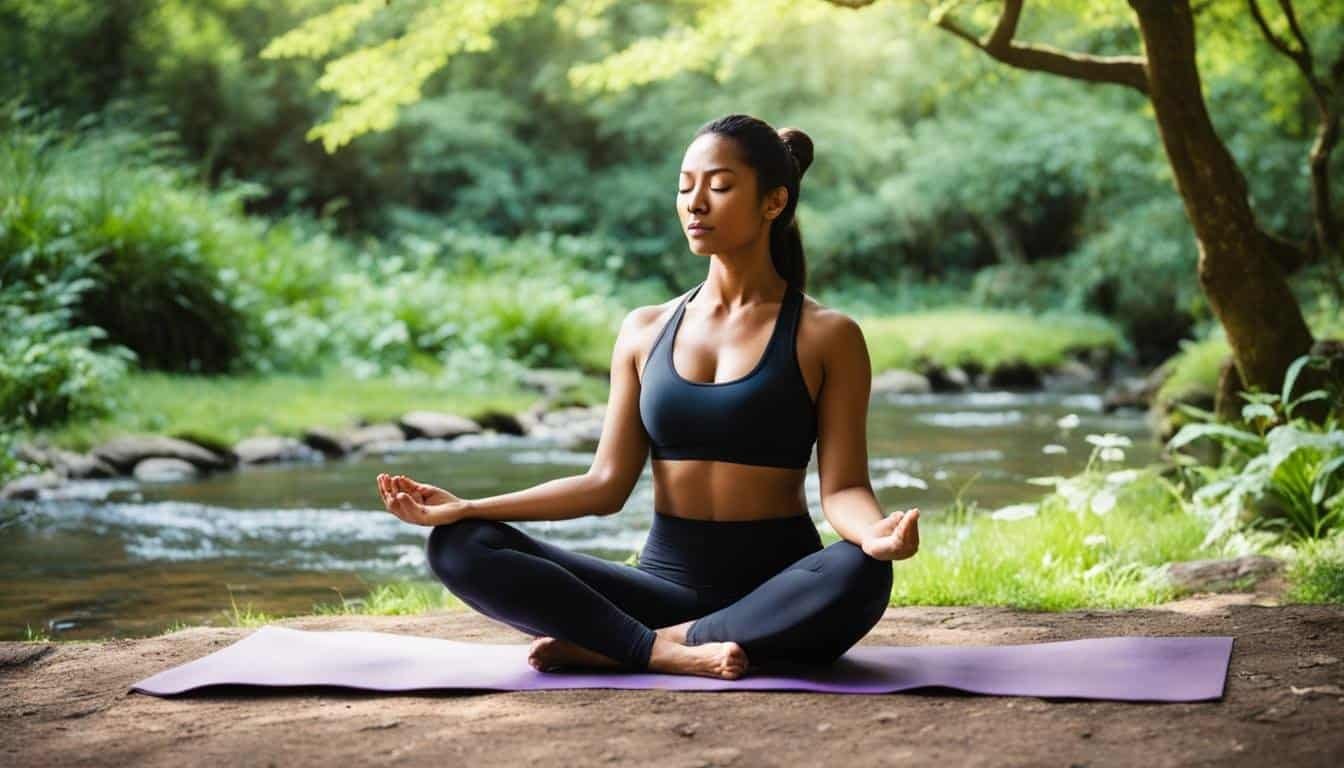Mindfulness Meditation: A Beginner’s Guide
Welcome to the world of mindfulness meditation! If you’re new to this practice, you’re in the right place. Mindfulness meditation is a simple yet powerful technique that can help you cultivate a greater sense of presence, awareness, and well-being in your life.
At its core, mindfulness is the ability to be fully present and aware of where you are and what you’re doing, without being overwhelmed by what’s happening around you. It’s about training your attention to stay focused on the present moment, rather than being consumed by thoughts of the past or worries about the future.
In this beginner’s guide, we will explore the foundations of mindfulness meditation and provide you with practical techniques to get started on your journey. Whether you’re looking to reduce stress, improve focus, or enhance your overall well-being, mindfulness meditation can be a valuable tool in your daily life.
Key Takeaways:
- Mindfulness meditation is the practice of training your attention to stay focused on the present moment.
- It can have numerous mental and physical health benefits and can be practiced for just a few minutes each day.
- Mindfulness is the awareness that arises through paying attention on purpose, in the present moment, and without judgment.
- There are different types of meditation techniques you can explore, such as body scan meditation and loving-kindness meditation.
- Building a meditation habit and overcoming common challenges can help you deepen your practice.
Understanding Mindfulness and Meditation
Mindfulness is the awareness that arises through paying attention on purpose, in the present moment, and without judgment. It helps you become more present and aware of your mental, emotional, and physical processes. Meditation, on the other hand, is the intentional practice of mindfulness. It involves training your brain to be fully present and focused.
Both mindfulness and meditation have been scientifically proven to provide numerous benefits for your overall well-being. They can reduce stress and anxiety, improve focus and concentration, promote better emotional regulation, and enhance your mental and physical health.
“Mindfulness is not about getting anywhere else, it’s about being where you are and knowing it.”
— Jon Kabat-Zinn
By practicing mindfulness and meditation regularly, you can create a greater sense of inner peace, calmness, and clarity in your life. These practices empower you to navigate through daily challenges with more ease and bring a deeper level of awareness to your experiences.
The Benefits of Mindfulness Meditation
Mindfulness meditation offers a wide range of benefits, improving various aspects of your physical and mental well-being. Here are some of the key benefits:
- Reduced stress and anxiety
- Improved focus and concentration
- Enhanced emotional well-being
- Greater self-awareness and self-compassion
- Better sleep quality
- Increased resilience to challenges
- Promotion of overall mental and physical health
These benefits make mindfulness meditation a valuable practice for individuals seeking to enhance their overall quality of life and cultivate a greater sense of well-being.
| Benefits | Mental Health | Physical Health |
|---|---|---|
| Stress Reduction | ✔ | ✔ |
| Anxiety Relief | ✔ | ✔ |
| Improved Concentration | ✔ | |
| Emotional Regulation | ✔ | |
| Enhanced Sleep | ✔ | |
| Overall Well-being | ✔ | ✔ |
As you can see from the table above, mindfulness meditation provides significant benefits for both mental and physical health. It is a powerful tool for promoting overall well-being.
Getting Started with Mindfulness Meditation
To start your mindfulness meditation practice, follow these beginner’s tips to ensure a smooth and enjoyable experience:
Find a Quiet Space
Begin by finding a quiet and comfortable space where you can sit undisturbed for 5 to 10 minutes. This will allow you to fully immerse yourself in the practice without distractions.
Make It a Daily Habit
Schedule a specific time each day for your meditation practice. Consistency is key when it comes to experiencing the maximum benefits of mindfulness meditation.
Observe the Present Moment
When you start meditating, focus on observing the present moment as it is, without judgment or attachment. Allow your thoughts to come and go without getting caught up in them.
Focus on Your Breath or Body Sensations
To anchor your attention during meditation, you can either concentrate on your breath or use a body scan technique. Pay attention to each inhale and exhale or bring your awareness to various sensations throughout your body.
Be Kind to Yourself
Remember that mindfulness meditation is a practice that requires patience and consistency. Be kind to yourself if you find your mind wandering or if you’re not able to maintain focus initially. With time and practice, you’ll develop greater mindfulness.
The image above illustrates a beginner engaging in mindfulness meditation, focusing on breath awareness.
By following these beginner’s tips and exercises, you can start your mindfulness meditation journey with confidence and enjoy the mental and physical benefits it brings.
| Benefits of Getting Started with Mindfulness Meditation |
|---|
| Reduces stress and anxiety |
| Improves focus and concentration |
| Enhances self-awareness |
| Promotes emotional well-being |
| Increases overall mental clarity |
| Improves sleep quality |
| Boosts resilience and adaptability |
Engaging in regular mindfulness meditation provides these and many more benefits, making it a valuable practice for beginners and experienced meditators alike.
Different Types of Meditation Techniques
While mindfulness meditation is a popular choice for beginners, there are other types of meditation techniques you can explore. Each type offers a unique way to cultivate mindfulness and can be beneficial for different individuals depending on their preferences and needs.
1. Body Scan Meditation
Body scan meditation involves focusing your attention on each part of your body, starting from your toes and moving up to your head. It’s a powerful technique that promotes deep relaxation, self-awareness, and the release of tension in the body. Through this practice, you learn to observe physical sensations without judgment and bring a sense of curiosity and kindness to your body.
2. Loving-Kindness Meditation
Loving-kindness meditation involves directing feelings of compassion, love, and kindness towards yourself and others. It cultivates a sense of connection, empathy, and goodwill. In this practice, you silently repeat affirmations or phrases such as “May I be happy, may I be healthy, may I be safe, may I live with ease” while extending these wishes to yourself, loved ones, neutral people, difficult people, and eventually to all sentient beings.
“Loving-kindness meditation is not just a mere practice; it is a way of life.” – Sharon Salzberg
By regularly practicing body scan meditation and loving-kindness meditation, you can deepen your mindfulness practice and experience greater emotional well-being, self-compassion, and connection with others.
| Type of Meditation Technique | Benefits |
|---|---|
| Body Scan Meditation |
|
| Loving-Kindness Meditation |
|
Exploring different types of meditation techniques allows you to find what resonates with you and aligns with your specific goals and needs. Don’t be afraid to experiment and incorporate a variety of techniques into your mindfulness practice for a well-rounded and transformative experience.
Building a Meditation Habit
Building a meditation habit is crucial for reaping the full benefits of this transformative practice. By incorporating daily meditation into your routine, you can cultivate inner peace, reduce stress, and enhance your overall well-being.
Follow these simple steps to build a meditation habit that sticks:
- Set a Fixed Schedule: Choose a specific time each day to meditate and commit to it. Whether it’s in the morning, during your lunch break, or before bed, consistency is key. By establishing a regular schedule, you’ll make meditation a non-negotiable part of your day.
- Create a Sacred Space: Designate a quiet and peaceful area where you can practice meditation without distractions. Clear away clutter, add soft lighting or candles, and incorporate items that foster a sense of serenity. This dedicated space will signal to your mind and body that it’s time to relax and be present.
- Start Small: Begin with shorter meditation sessions, especially if you’re new to the practice. Aim for just 5 to 10 minutes a day. As you become more comfortable and proficient, gradually increase the duration of your sessions. Remember, consistency is more important than duration.
- Focus on Guided Meditations: If you find it challenging to stay focused on your own, try using guided meditations. These pre-recorded or app-based sessions provide step-by-step instructions and soothing background music, making it easier to stay present and engaged.
- Enjoy the Benefits: Even just a few minutes of daily meditation can have powerful effects on your mental and physical well-being. Reduced stress, increased focus, improved sleep, and enhanced emotional regulation are just some of the benefits you can experience.
A Sample Daily Meditation Routine
To give you an idea of how to structure your daily meditation practice, here’s a sample routine:
| Time | Activity |
|---|---|
| 6:00 AM | Wake Up |
| 6:15 AM | Meditation |
| 6:30 AM | Stretching/Yoga |
| 7:00 AM | Breakfast |
| 12:00 PM | Lunch Break |
| 12:15 PM | Meditation |
| 6:00 PM | Exercise/Walk |
| 7:00 PM | Meditation |
| 7:15 PM | Dinner |
| 10:00 PM | Wind Down |
| 10:15 PM | Meditation |
| 10:30 PM | Bedtime |
Remember, this is just a sample routine. Feel free to adjust it according to your own preferences and schedule.
By following these steps and establishing a daily meditation routine, you’ll create a positive habit that nurtures your mind, body, and spirit. Start small, be consistent, and enjoy the numerous benefits that daily meditation brings.
Overcoming Common Challenges in Meditation
Starting a meditation practice can come with its fair share of challenges, but don’t be discouraged. It’s completely normal to struggle with quieting the mind and staying focused. Remember, the goal of meditation is not to stop your thoughts completely, but rather to cultivate non-judgmental awareness and redirect your attention when distractions arise.
Here are some effective strategies to overcome common challenges in meditation:
- Set a Clear Intention: Before you begin your meditation session, set a clear intention for what you want to achieve. This can help you stay focused and committed to the practice.
- Choose a Meditation Object: Whether it’s your breath, a mantra, or a visual anchor, choose a meditation object to anchor your attention. When your mind starts to wander, gently bring your focus back to this object.
- Practice Self-Compassion: Be kind to yourself and acknowledge that distractions and wandering thoughts are a natural part of the meditation process. Approach these moments with self-compassion and gentle redirection.
- Observe Without Judgment: Instead of getting caught up in your thoughts or judging them, practice observing them with curiosity and acceptance. As you develop this skill, your thoughts will become less intrusive, allowing for deeper states of mindfulness.
- Let Go of Attachments: Distractions will inevitably arise during your meditation practice. Instead of getting attached to these distractions or getting frustrated, learn to let them go. Acknowledge their presence, but don’t allow them to pull you away from your focus.
- Consistency is Key: Consistent practice is essential for overcoming meditation challenges. Set aside a dedicated time each day for meditation, even if it’s just a few minutes. Over time, you’ll develop the ability to manage distractions more effectively.
Remember, meditation is a journey, and each session is an opportunity for growth and self-discovery. With patience, perseverance, and a gentle approach, you can overcome the challenges and experience the many benefits of a quiet and focused mind.
Testimonial
“Meditation has been a transformative practice for me, but it wasn’t always easy to quiet my racing mind. Learning to observe without judgment and redirecting my attention has been key. Now, meditation brings me a deep sense of peace and clarity.”
– Sarah Jameson, Meditation Enthusiast
Exploring the Benefits of Meditation
Research has shown that meditation has a wide range of benefits for both your mental and physical health. By incorporating mindfulness meditation into your daily routine, you can experience these positive effects and improve your overall quality of life.
Regular meditation practice offers the following benefits:
- Improved focus and concentration: Meditation helps train your mind to stay present and alert, leading to enhanced focus and concentration in your daily activities.
- Reduction in stress and anxiety: Practicing meditation allows you to quiet your mind, reduce the effects of stress, and cultivate a greater sense of calm and relaxation.
- Enhanced self-awareness and self-esteem: Meditation helps you become more aware of your thoughts, emotions, and behaviors, leading to a deeper understanding of yourself and increased self-confidence.
- Better sleep quality: Regular meditation can help improve your sleep patterns, allowing you to fall asleep faster and enjoy a more restful and rejuvenating sleep.
- Promotion of emotional well-being: Through mindfulness meditation, you can develop a greater capacity to manage and regulate your emotions, leading to increased emotional resilience and overall well-being.
Meditation has also been found to have positive effects on brain function and structure. Studies have shown that regular meditation can:
- Increase gray matter volume in certain brain areas associated with memory, learning, and emotional regulation.
- Enhance cognitive abilities, such as attention, memory, and problem-solving skills.
- Improve overall brain function and neural connectivity.
By dedicating a few minutes each day to mindfulness meditation, you can reap these mental and physical health benefits, reduce stress, and improve your overall well-being.
| Benefits of Mindfulness Meditation | Mental Health Benefits | Physical Health Benefits |
|---|---|---|
| Improved focus and concentration | Reduced stress and anxiety | Enhanced immune system function |
| Increased self-awareness and self-esteem | Improved emotional regulation | Lower blood pressure |
| Better sleep quality | Enhanced mood and well-being | Reduced inflammation |
| Improved resilience to negative emotions | Lowered risk of heart disease |
Advanced Meditation Techniques
Once you have established a regular meditation practice, it’s time to take it to the next level. Advanced mindfulness meditation techniques can help you deepen your meditation practice and explore different ways to cultivate mindfulness. By expanding your repertoire of techniques, you can continue to grow and evolve on your meditation journey.
One advanced technique is open-awareness meditation, also known as choiceless awareness. This practice involves non-judgmentally observing your thoughts, feelings, and sensations as they arise, without getting attached to or engaging with them. It allows you to expand your awareness beyond a single focal point and cultivate a sense of spaciousness and presence in your mind.
Another advanced technique is Vipassana meditation, which translates to “insight meditation.” It involves observing the impermanent and ever-changing nature of your thoughts, emotions, and bodily sensations. This practice helps you develop a deep understanding of the interconnectedness of your inner experiences and the transient nature of reality.
“In Vipassana meditation, you learn to see the impermanent nature of your thoughts, emotions, and sensations. This insight can bring about profound wisdom and liberation.”
Aside from advanced mindfulness meditation, there are also various other types of meditation you can explore to deepen your practice. Walking meditation involves bringing your attention to the sensation of walking, intentionally focusing on each step and the movement of your body. Chanting meditation involves repeating a mantra, sacred sound, or phrase to calm the mind and connect with a deeper sense of spirituality. Visualization meditation involves using your imagination to create vivid mental images that evoke feelings of relaxation, positivity, and healing.
| Advanced Meditation Techniques | Description |
|---|---|
| Open-Awareness Meditation | A practice of non-judgmentally observing thoughts, feelings, and sensations without getting attached to them. |
| Vipassana Meditation | Insight meditation that focuses on observing the impermanent nature of thoughts, emotions, and sensations. |
| Walking Meditation | Bringing attention to the sensation of walking and the movements of the body. |
| Chanting Meditation | Repeating mantras, sacred sounds, or phrases to calm the mind and connect with spirituality. |
| Visualization Meditation | Using imagination to create mental images that induce relaxation and positive emotions. |
By exploring these advanced techniques and different types of meditation, you can deepen your connection with yourself, enhance your self-awareness, and experience profound insights and transformations on your meditation journey.
Conclusion
Mindfulness meditation is a powerful practice that can have a transformative impact on your life. By dedicating just a few minutes each day to this practice, you can cultivate a greater sense of presence, awareness, and well-being.
Whether you are a beginner or have been meditating for a while, the key to success lies in approaching mindfulness meditation with kindness, patience, and consistency. Remember that meditation is a journey, and progress is not about perfection but about the commitment to showing up and practicing regularly.
As you continue on your meditation journey, embrace the process and enjoy the numerous benefits that mindfulness meditation has to offer. Experience the peace, clarity, and positive impact it can bring to your mental and physical health, as well as to your relationships and daily life.
In conclusion, mindfulness meditation is a simple yet profound practice that can enhance your overall well-being and help you cultivate a deeper connection with yourself and the world around you. So, take a few moments each day to sit, breathe, and be present, and you will discover the transformative power of mindfulness meditation.







